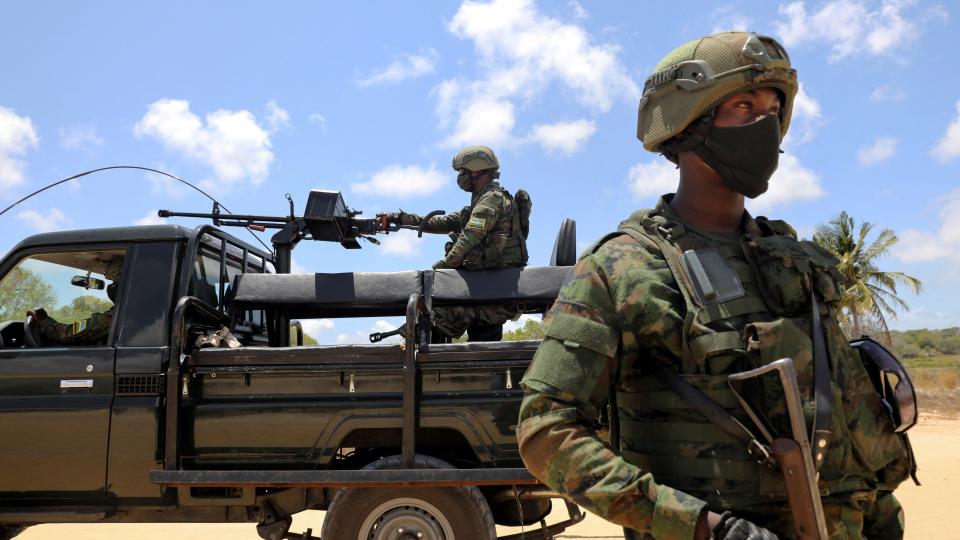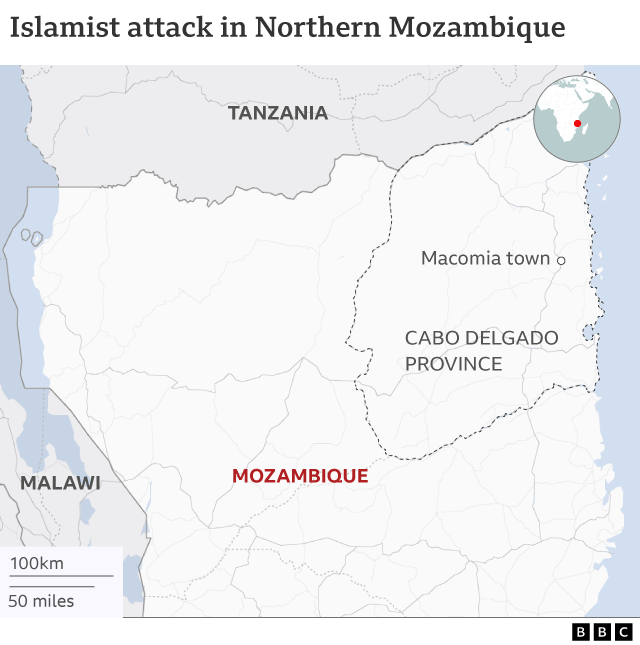“If [the jihadists] If they had known I was a government official, they would have beheaded me,” Tomas Langa, a civil servant in northern Mozambique, told the BBC.
He feels he had a lucky escape. We changed his name for his safety.
Awakened in the early hours of May 10 by loud gunfire, Langa looked out the window and saw four armed men standing at the door of his house, in the city of Macomia, in the insurgency-hit province of Cabo Delgado.
He was terrified and fled to the interior, where he hid for three days eating cassava.
“I was lucky they just insulted me while I was running,” he said.
Fighters linked to the Islamic State (IS) group attacked government buildings and positions in the city before looting stores and warehouses.
The armed men kept the area under siege for two days, creating an atmosphere of fear and chaos.
Jihadists raided a medical center run by the humanitarian agency Doctors Without Borders (MSF), seizing vehicles and medical supplies.
MSF said it had no choice but to relocate staff and suspend its operations in Macomia.
Alfane Silva, a father of five, told the BBC he was detained and interrogated by eight armed men. Again, this is not his real name.
“They wore military equipment and carried heavy weapons,” he said.
“They told me to run to the bush or they would kill me if I stayed in the city.”
Silva said it took two days for government reinforcements to arrive, but by then the militants had already left.
More than 700 people fled this latest round of fighting in Macomia, according to the International Organization for Migration (IOM).
Those left behind, like Silva and Langa, are left without medical facilities, without electricity and live in constant fear of another attack.
It was the latest resurgence in violence that has subsided as security forces, backed by troops from neighboring states, appeared to be bringing the situation under control.
But now, many of those troops are being withdrawn.

The Southern African Development Community (Sadc) mission, made up of around 2,000 soldiers from eight countries, said it will withdraw its forces from Mozambique by July 15, and will not extend its three-year mandate.
Regional security experts have warned that this may be too soon as the area remains unstable.
Botswana and Lesotho have already withdrawn their soldiers, while Angola and Namibia are in the process of leaving.
However, Tanzania, which borders the country to the north, will maintain 300 soldiers, reports the private newspaper Zambeze, based in the Mozambican capital, Maputo.
Dastan Kweka, an expert on governance in Tanzania, told the BBC that authorities expect security in the region to deteriorate further.
South Africa, which currently contributes more than 1,000 troops to peacekeeping efforts, said it will keep its troops in Mozambique until the end of 2024, but not as part of the Sadc mission.
On the other hand, Rwanda, which is not part of Sadc but has supported Mozambique, announced that it will send an additional 2,000 soldiers to the country.
Rwandan army spokesman Brigadier General Ronald Rwivanga told the BBC they were “simply reinforcing” their force. The decision had nothing to do with Sadc’s withdrawal or recent attacks, he said.
When Rwanda sent its first 1,000 soldiers in 2021, it said it was supporting efforts to restore the Mozambican government’s authority in Cabo Delgado.
This followed the signing of several bilateral agreements between the two countries in 2018.
The additional Rwandan troops will help fill the gaps left by Sadc forces in northern Mozambique.
Meron Elias, East and Southern Africa analyst at Crisis Group, said the Sadc mission in Mozambique faces financial constraints, relying heavily on contributions from member states to keep it running.
She said the regional bloc has shifted its focus to stabilizing the precarious situation in the Democratic Republic of Congo.
In December 2023, Sadc sent troops to DR Congo to help the government combat the myriad rebel groups plaguing the east of the country.


The al-Shabab group, affiliated with IS in Mozambique – which is not linked to the group with the same name in Somalia – has been operating in Cabo Delgado since 2017.
Its insurgents killed hundreds of people, displaced communities and burned cities and villages.
They have been fighting for control of the region rich in natural gas and minerals such as hydrocarbons, graphite and rubies.
In July 2021, French energy giant Total Energies was forced to suspend its $20 billion (£16 billion) liquefied natural gas project following a shocking development. attack on the village of Palma.
Following the deployment of Sadc and Rwandan troops in the same year, aid agencies and the government reported that security had improved in some areas and normal life was gradually returning.
Unfortunately, this progress was short-lived.
Since December 2023, attacks have increased again.
More than 110,000 people were forced to flee their homes, according to the IOM.
Tomas Queface, a researcher at the Cabo Ligado de Moçambique website that monitors the violence, said the militants managed to hold Macomia for two days, recruiting more fighters, including children.
A report by the campaign group Human Rights Watch mentioned two people from the same family who saw their 13-year-old nephew looting alongside the jihadists during the attack.
Neighbors in the north of Mozambique are paying nervous attention to what is happening.
In 2020, jihadists attacked villages along the border with Tanzania, killing around 25 people, looting shops and torching homes.
Since then, Tanzania has increased security by imposing curfews in some border villages, increasing patrols and restricting movement between the two countries.
Mr Kweka said although this strategy was successful, it was costly. Tanzania’s defense budget has increased by 10% annually since 2021.
Meanwhile, there are growing concerns that if the Cabo Delgado insurgency gains more momentum, other neighboring countries, such as Malawi, could be affected if the insurgents cross the border, according to analyst Meron Elias.
She said there was some evidence of the development of regional links between Al-Shabab in Mozambique and the Allied Defense Forcesan IS affiliate operating in the Democratic Republic of Congo and parts of Uganda – although the level of cooperation is unclear.
Regional security experts say Mozambique’s armed forces could secure a military victory if they were further strengthened and that this is not the time to withdraw foreign troops.
But the only long-term solution is to address the social and economic challenges experienced in the north of the country, where living standards are lower than in the south, fueling complaints of discrimination, which is exploited by jihadists.
More BBC stories about Mozambique:


Go to BBCAfrica.comexternal for more news from the African continent.
Follow us on Twitter @BBCAfricaon Facebook on BBC Africaor on Instagram at bbcafrica





























